Martin Edwards's Blog, page 34
November 10, 2023
Forgotten Book - Greenshards
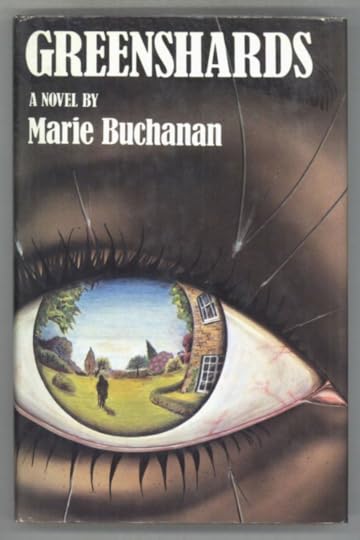
I don't think there's much doubt that Greenshards (published in the US under the title Anima) is a forgotten book. It dates back just over half a century, to 1972, but in many ways I think it remains a fresh read, and a gripping one. The author was Marie Buchanan, but she later became much better known as Clare Curzon, a name she adopted in 1979 when A Leaven of Malice, one of her most notable books, was published by Collins Crime Club. She later wrote a long series about the cop Mike Yeadings.
As I mentioned after I learned of her death, thirteen years ago, Clare (as I knew her) was a very pleasant woman. She was also a very interesting and versatile writer. One of the comments on that blog post mentioned (and praised) Greenshards, which I came across much later, thanks to acquiring a copy inscribed to another Eileen, my friend and fellow writer Eileen Dewhurst. It's taken me ages to get round to reading it, but I'm very glad I did.
The Gollancz first edition jacket describes the book as 'one of the strangest first novels ever to arrive on its publisher's desk'. In fact, she'd already published novels under another name, Rhona Petrie, but there's no denying that it's a strange and unusual book. Daphne du Maurier admired it, and apparently it even drew comparisons with The Exorcist (although the mood is very, very different). There is a strong supernatural element in the story, but it never overwhelms the story, which definitely counts as a mystery, albeit of an unorthodox type.
I don't want to say anything that will spoil the story (the Gollancz jacket tells far too much of it, and I'm glad I didn't read it until after I'd finished the book) but suffice to say that Greenshards is an old house with a melancholy history and that the connections between two families, the Mintons and the Blanchards, are at the heart of a twisting storyline that ensures you can never be sure what is coming next. This is a sophisticated, superior novel which I'm glad to recommend.
November 8, 2023
Don't Worry Darling - 2022 film review

Don't Worry Darling is a high-profile recent movie directed by Olivia Wilde, who also has a significant role as an actor. It's a glossy film, good to look at, and stars Florence Pugh as Alice Chambers, a 1950s housewife who leads an apparently idyllic life in a Californian town called Victory while her charming husband Jack (Harry Styles, of all people; he's come a long way since his youth in Holmes Chapel...) and his male neighbours go out to work at Victory HQ in the desert. The wives aren't encouraged to ask about their husbands' jobs....
From the outset, it's obvious that in Victory, all is not as it seems. When Alice sees a plane crash in the desert, she allows curiosity to get the better of her (an oddity of the script, by Katie Silberman, is that the plane crash isn't clearly explained) and before long cracks start to appear in the smooth surface of life in Victory.
Florence Pugh is a gifted actor and her performance as Alice is first-rate, as we've come to expect. There are some interesting ideas floating around in this film, and it's enjoyed huge commercial success, but there are good reasons why most critics haven't been enthused. Harry Styles is an easy target for criticism, because he doesn't have the experience to give real depth to the part of Jack, but he doesn't do a bad job.
The real problem, I fear, is with the script. The shadows of The Stepford Wives and The Prisoner, both of which are classics, loom large over Don't Worry Darling. However, there is no reason why this kind of story can't work very well indeed, if the themes and ideas from films and TV shows of the past are reworked in a fresh and engaging way. The trouble is that the story is told in a clunky and sometimes incoherent manner with numerous loose ends dangling, but not in a good way. I didn't expect a film as good as the original The Stepford Wives, but even so I found this one frustrating and disappointing. A missed opportunity.
November 6, 2023
'We Know You're Busy Writing': The Collected Short Stories of Edmund Crispin
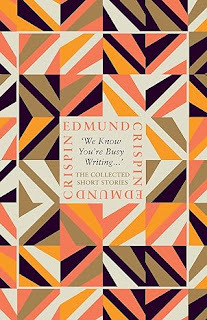
Edmund Crispin (in real life Bruce Montgomery) is one of the few writers of traditional mysteries who has remained consistently in print since his first novels appeared in the early 1940s. Quite an achievement, and certainly a testament to the entertainment value of his fiction. Recently, HarperCollins have reprinted his novels in new paperback editions so attractive that I've even looked on The Glimpses of the Moon, his last novel, much more benignly than I had done previously. Now, as the icing on the cake comes the publication of his collected short fiction.
This handsome book takes its title from my favourite Crispin short story, 'We Know You're Busy Writing,' which I included in the British Library anthology Murder by the Book a year or two back. Among my other favourites is 'Who Killed Baker?', which Crispin co-wrote with his pal and fellow musician Geoffrey Bush.
Two Crispin collections, Beware of the Trains and Fen Country, have been available for many years, but here the stories about Gervase Fen are helpfully separated from the 'stand-alone' stories. What's more, this volume also includes four stories not in those two books, which have in recent years been brought to our attention by Tony Medawar in his collections of little-known traditional mysteries. Of these, 'The Hours of Darkness' is especially compelling.
I was delighted to see a very good set of sources at the back of the book, most useful for researchers. All in all, this is a terrific book. If you haven't read Crispin before, and in particular if you're a fan of short stories, you're in for a treat.
November 3, 2023
Forgotten Book - The Party at No. 5 aka The Cellar at No. 5
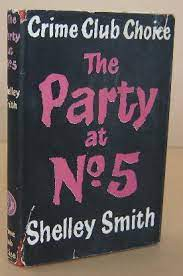
I've often written about my enthusiasm for the novels of Shelley Smith. She was an ambitious writer, who was always keen to do something different, and that approach (while not necessarily conducive to great commercial success) and the flair with which she pursued it meant that she was one of the most impressive British crime writers of the 1950s. I regret the fact that her books aren't more widely known.
The Party at No.5, which dates from 1954, offers a good example of her skill and economical and effective literary style. It's essentially a novel about character, about the vagaries of human nature. It's also a book which is about women and the relationships they have with each other. The male characters (including a solicitor whose grasp of the law struck me as very shaky) only have minor parts, although they are depicted with Smith's customary cool insight and wit.
Mrs Rampage is an elderly woman with a rambling old house in London. Actually, by modern standards I don't think she is really ancient, but attitudes to older people were different then, in a rather depressing way. She is persuaded to take in as a sort of companion-helper a woman called Mrs Roach. Mrs Roach is, on the surface, a very pleasant and caring individual who has an unrequited longing for a younger woman, Eleanor, who is stuck at home with her aged father. But the two women don't hit it off and although Mrs Rampage becomes increasingly dependent on Mrs Roach, her unpleasantness towards the other woman is a catalyst for crime.
This isn't a whodunit, but I found it a highly suspenseful read. Smith's prose is clear and engaging and her depiction of the way that relatively minor character flaws can lead to very damaging consequences is compelling. It's a tribute to her gifts that although I didn't much like either of the two lead characters, I became intrigued by them and wanted to know what their fate would be.
November 1, 2023
Death at Wolf's Nick by Diane Janes
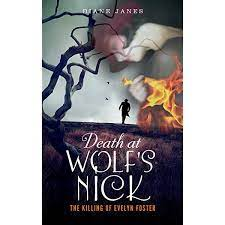
When I was up in Berwick recently, Lindsay Allason-Jones kindly gave me a copy of Death at Wolf's Nick by Diane Janes. I've not seen Diane for ages, but we've been on panels together in the past, and she is one of those writers who has achieved success both with fiction and non-fiction. I've mentioned her several times on this blog, for instance in relation to her book about the . This book is another of her in-depth true crime studies, and it deals with a case that remains unsolved to this day, that of Evelyn Foster.
I was already familiar with the case, because many years ago I read Julian Symons' discussion of the case in an essay in Beyond Reasonable Doubt, which is an interesting book, though one of his less well-known publications. Diane doesn't mention it in her book, so I'm unsure what she made of it, or whether she's aware of it. But she does deal at some length with a previous study of the case, by Jonathan Goodman, who was a noted criminologist. Suffice to say that she doesn't think much of his research.
The death of Evelyn Foster was strange, sad, and deeply disturbing. She was a youngish taxi driver based in Otterburn, Northumberland, a lovely place, but also a rather lonely part of the world on a wintry night. One night, she took a passenger in rather odd circumstances, and was later found, badly burned, as was her car. The story she told about what happened was not, however, believed by the police (who come in for a lot of criticism in this book).
Diane's research is impressive, with reams of important detail about timings and local geography. Her theory about what happened seems plausible, if not proven. It's an extraordinary case. I'd have liked to get a fuller understanding of Evelyn's personality, and those of one or two of the other key players in the story, and also what happened to them in later years, but perhaps Diane felt restricted by the material that was available and verifiable. An interesting book, well worth reading if you're keen on true crime.
October 30, 2023
Marv Lachman R.I.P.
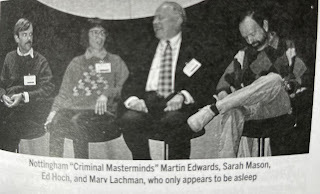
I was very sorry to learn a few days ago that Marv Lachman, the highly respected American author and commentator on crime fiction, has died. A few weeks ago, Marv sent a poignant email to a number of his friends in the crime writing world, indicating that he was in a poor state of health and didn't expect to live much longer. I was truly saddened to receive it, because we have known each other for the best part of 30 years and have had some good times together at conventions. He was also extremely supportive of my own writing, both the novels and the non-fiction. Like all the best critics, he was constructive, insightful, and shrewd, but also generous when he judged it appropriate.
One of our very first encounters in person was at the Nottingham Bouchercon in 1995, when Marv and I, along with the great short story writer Ed Hoch and my fellow Brit Sarah J. Mason took part in a Mastermind quiz (Sarah and I had previously taken part in one at the London Bouchercon in 1990, along with Jim Huang and Tony Medawar). The above photo is taken from Marv's book about crime fandom, The Heirs of Anthony Boucher; he noted wryly in the caption that he only appears to be asleep!
That book is excellent, and so are his books about mystery plays and the American Regional Mystery (he inscribed the latter to me, saying that I should write the British Regional Mystery - maybe one of these days!) He was also an incisive commentator, not least for Janet Rudolph's Mystery Readers Journal and George Easter's Deadly Pleasures. At Bouchercon in San Diego, just a day or so after Marv had sent us his email, George paid a marvellous tribute at the opening ceremonies to Marv which was absolutely spot on. See also George's online tribute here and Janet's here
I enjoyed all my conversations with Marv, and also met his wife Carol once or twice. The last time we met was at yet another Bouchercon, in Dallas. He was in good form, then, and I have a number of happy memories of our various encounters. He will be sadly missed.
October 27, 2023
Forgotten Book - Crack of Doom

Leo Bruce's Crack of Doom is a Carolus Deene story dating from 1963. When published in the USA, it was retitled Such is Death - I can't imagine why. I'm working my way slowly through quite a number of the Deene books and this one boasts his trademarks - heavy on dialogue and with some nice, if light touches of characterisation. I particularly enjoyed a vicar who is keen on criminology and wants to assist Carolus.
There are two features of the book which make it especially worthy of note. First, some of the action takes place at Christmas. Second, and perhaps more significantly so far as the storyline is concerned, the setting is one that always exerts a great appeal to me (and, I guess, many othe readers) - an out-of-season English seaside resort.
The story opens with an extract from the journal of someone who wants to commit a motiveless murder. The idea of the motiveless murder has long appealed to me and it can work very well in a crime novel. Here, I think Bruce came up with a very neat plot idea, but although this novel has quite a bit of merit, I'm not sure he made the best possible use of it.
One reason why I was slightly disappointed is this: I don't think that the culprit, as presented in the novel, is easily reconciled with the author of the journal. Another reason is that the solution is presented in a rather tame way, and the coda to the story isn't quite as effective as it might have been. Both these flaws could, I believe, have been addressed by strong editing. Perhaps Bruce was in too much of a rush. However, it's still quite an entertaining story, even if - with such pleasing ingredients - it could have been more powerful.
October 25, 2023
The Life of Crime wins the Macavity Award
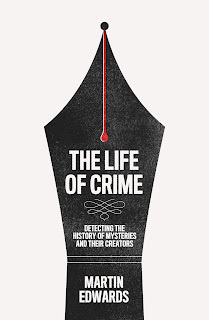
I'm delighted to report that The Life of Crime has won the Macavity award, given by Mystery Readers International, for the best critical/non-fiction book. This is the third time I've won a Macavity and The Life of Crime has received four awards in all (the others are the Edgar, the Anthony, and the CrimeFest H.R.F. Keating award) as well as being shortlisted for two more.
It's been a unique year for me in terms of honours of this kind. It feels quite surreal, so much so at the moment that I'll save further comment for another day, when I've had time to think about everything that has happened. But I must say right now how grateful I am to those who have voted for The Life of Crime as well as to those who have given it such wonderful reviews - and of course, everyone who has read it!
The paperback edition will come out next May. More about that on another occasion. Meanwhile, I'm off to celebrate!
October 23, 2023
All the Lonely People - in Spain and elsewhere...
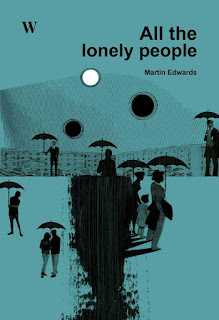
I always hoped that my novels would have staying power, and this book has done very well for me over the years, starting with reviews in The Times and elsewhere and a nomination for the CWA award for best first crime novel. There were, if I remember rightly, seven nominees and the ultimate winner was Walter Mosley's Devil in a Blue Dress - not bad company to be in. In the UK alone, it's been published over the years by Piatkus, Transworld, Hodder, Andrews/Acorn, and Arcturus, so it's certainly had longevity.
Of course, one's writing changes (and, with any luck, improves) over the years, and there's no doubt that if I were writing the story today I'd write it a bit differently. But I like to think that in some ways ahead of its time, both in its focus on minority characters and on Golden Age plotting and references. Not that these features attracted any attention back in the 1990s! One thing that gratified me enormously a while back was when a school librarian told me that the book had become very popular at the school. Given that the pupils were born many years after the book was written, I felt this said something about the story. It's a young man's book, and imperfect, but I remain very glad I wrote it.
So my sincere thanks go to the Who team for showing faith in Harry Devlin's relevance to their readers in the 21st century. In case you're wondering, the English language edition of the book (see the cover image below) is very much available in print or as an ebook And in answer to a question I'm often asked - will Harry ever return? My answer is - you never know!
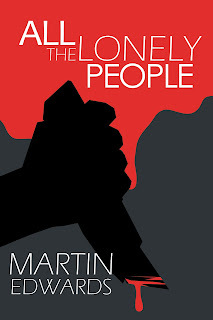
October 22, 2023
Word Monkey by Christopher Fowler
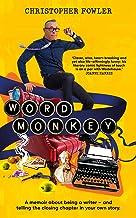
Regular readers of this blog will know I was saddened by the death, far too young, of , who was as entertaining a companion in real life as he was on the page. However, he did leave, in addition to a notable body of work, quite a bit of material that was still to be published. And I was delighted to read his final memoir, Word Monkey, posthumously published a short time ago.
There is so much here to enjoy. It's not a short book, but it's immensely readable and I devoured it quickly. It's a very poignant read, because among other things it deals with Chris's cancer diagnosis, but it's definitely not a misery memoir. 'Life-affirming' is a cliche, but it suits this book well.
Chris was very widely read and there's a lot of stuff here about books, including quite a lot I didn't know and was glad to learn. There are also some fascinating observations about the writing life, a subject naturally of great interest to both of us.
For Golden Age fans, there is an extremely enjoyable chapter titled 'In the Library with a Candlestick' (disclaimer: I get a mention in it) One doesn't have to share all Chris's opinions to find his views on this subject, as on many others, interesting and often persuasive. I was reminded again of my regret that, although he and I had quite a number of conversations, there weren't many more. Strongly recommended.



